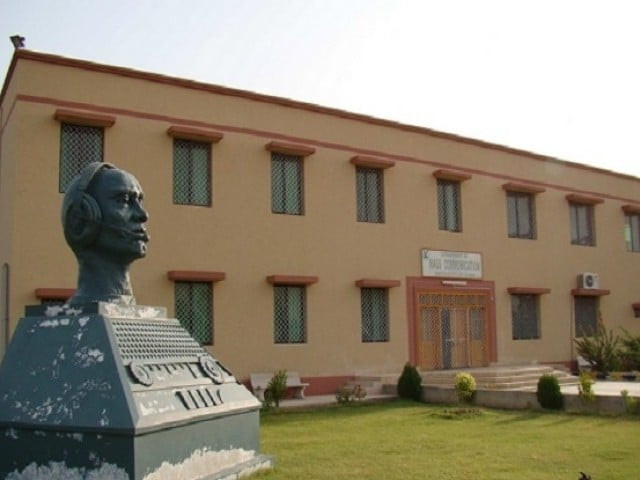Understaffed: Sindh University’s art and design research programme comes under fire
Teacher contests legality of programmes offered, says institute does not meet prerequisites

“The [Master’s of Philosophy] MPhil programme lacks a fundamental prerequisite — the [Doctorate of Philosophy] PhD faculty,” contends the petitioner, assistant professor Wahida Bano Baloch, who has been teaching at the institute for around 12 years. She took the issue to court after unsuccessfully fighting the case with the varsity’s authorities and the Higher Education Commission.
Baloch completed her MPhil from Stockholm University, Sweden. She is presently enrolled in a PhD programme at the University of Bonn, Germany.
Initially established as the department of fine arts in 1970, it was upgraded to an institute in 2005. It offers four-year Bachelor’s programmes in fine arts with a major in painting, sculpture or ceramics and design with a major in communication design and textile design.

After initiating the controversial MPhil degree programme in 2014, two months ago, the institute accepted the transfer of a doctorate of philosophy researcher from the Pakistan Study Centre to complete his research at the institute.
The university announced a final PhD seminar for the transferred candidate, Saeed Ahmed Mangi, an assistant professor at the institute, on November 25.
In order to offer an MPhil degree programme, a teaching institute or a department within a university is required to have regular services of two PhD teachers in the faculty. For a PhD programme, at least three PhD faculty members are required.
“... as per the required criteria, there are no [regular] PhD faculty members for MPhil/PhD degree at the institute,” stated the institute’s director, assistant professor Naimatullah Khilji, in a correspondence dated June 16, 2014, with SU’s dean of research and graduate studies. This letter was written four months after the institute inducted its first batch of 13 MPhil students in February, 2014.
According to Baloch, Mangi’s change of registration from the centre to institute was based on Khilji’s precedent, who also got his registration changed the same way in April, 2015. But unlike Mangi, he is no closer to obtaining his PhD degree.
Khilji had allegedly submitted fake information to SU’s scrutiny committee, claiming that three PhD faulty members are available and that the PhD syllabus had also been approved.
The petitioner pointed out to the court a contradiction which controverted the availability of the PhD faculty members. According to her, Mangi’s research topic is ‘art of surface design on buildings of Talpur period in Sindh’. However, none of his two research guides are qualified in art and design. Prof (retd) Qamar Jehan Mirza, a guide, worked for the department of Sindhi and Prof (retd) Khalida Jamali, co-guide, worked for the department of economics.
Controversy also surrounds the research guides approved during a meeting of SU’s scrutiny committee on April 11, 2016, for all nine MPhil candidates at the institute. They have been practically given only one guide, Dr Abdul Fatah Daudpoto, who happens to be a visiting PhD faculty, who was awarded a PhD degree in the history of art and crafts by the Pakistan Studies Centre.
The committee named the former director of the institute, Prof Dr (retd) Mohammad Ali Bhatti, as co-guide for two MPhil researchers and a guide for one. However, interestingly, he claimed while responding to The Express Tribune, that he was not intimated that his name has been given as a research guide.
“I don’t know who those three MPhil scholars are. I have been living in the United States since early 2015 and have no connection with [the] institute of art and design,” he claimed. Prof Bhatti also reportedly brought this matter to the knowledge of the vice-chancellor.
One of the MPhil researchers, who requested anonymity, said that they are worried about ending their studies without being awarded a degree. “Or worse still, we may also have to change our registration from this institute to the Pakistan Studies Centre, where we will get a degree which will not be technically in art and design.”
The incharge, director Khilji, and Mangi could not be contacted for their version.
After considering all the facts produced in the court by the petitioner, the Hyderabad circuit bench, comprising justices Salahuddain Panhwar and Muhammad Iqbal Mehar, stayed the awarding of the PhD degree to Mangi. The court also put the respondents, including SU, the Higher Education Commission, Khilji, Mangi and the dean of the faculty of arts, on notice for December 22.
Published in The Express Tribune, December 9th, 2016.



















COMMENTS
Comments are moderated and generally will be posted if they are on-topic and not abusive.
For more information, please see our Comments FAQ